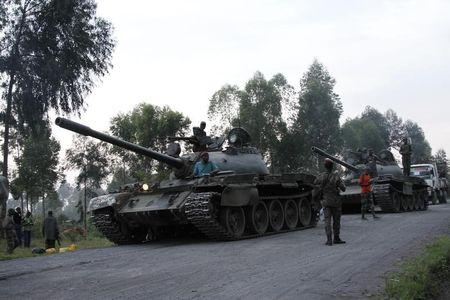Advertisement
Congo tells UN its offensive against Rwanda rebels going well
UNITED NATIONS (Reuters) - The army of Democratic Republic of the Congo has been making progress in an offensive against Rwandan rebels in the country's conflict-torn east, despite the withdrawal of United Nations support for the operation, Kinshasa told the U.N. Security Council.
In a May 8 letter to the president of the 15-nation council, Raimonda Murmokaite, released on Friday, Congo's U.N. mission also reiterated its desire to agree on an "exit strategy" for the withdraw of the U.N. peacekeeping force in Congo, MONUSCO.
Western diplomats say a months-long Congolese army (FARDC) campaign against the Democratic Forces for the Liberation of Rwanda (FDLR) rebels has achieved little and revived doubts about the will and capacity of Congo to defeat a group at the heart of decades of conflict in Africa's Great Lakes region.
Kinshasa has a different view, and described the operation in a positive light.
"These operations continue to have encouraging results," Congo's U.N. Ambassador Ignace Gata Mavita wrote to Murmokaite. "In South Kivu, the Uvira, Shabunda and Mwenga roads have been entirely cleared of FDLR sanctuaries, headquarters and command structures."
"The efforts of FARDC will now focus mainly on the Kalehe, Kabare and Walungu roads in this province, as well as the roads of North Kivu province that have not yet been cleared of FDLR," he added.
United Nations peacekeepers and FARDC had jointly planned a military campaign to take on the FDLR, which includes former soldiers and Hutu militiamen responsible for Rwanda's 1994 genocide, after it failed to meet a January deadline to disarm.
But MONUSCO withdrew planned support for the anti-FDLR operations, which would have ranged from food and transport to surveillance drones and attack helicopters, after Congo appointed two generals to head the offensive who are both accused of human rights abuses.
In March, the Security Council refused to cut the number of MONUSCO peacekeepers in Congo until progress was made in the campaign against the FDLR, snubbing government calls for a decrease.
Dozens of armed groups operate in eastern Congo, where a 1998-2003 conflict killed millions of people, mostly from hunger and disease. Both state and rebel forces have been accused by rights groups of rape, killing civilians and other war crimes.
In 2013, MONUSCO's 3,000-strong U.N. intervention brigade helped Congolese forces defeat Tutsi-led M23 rebels who had seized swaths of North Kivu. U.N. sanctions experts, Kinshasa and Western governments had accused Rwanda of supporting M23.
(Reporting by Louis Charbonneau; Editing by Jonathan Oatis)



















Add new comment